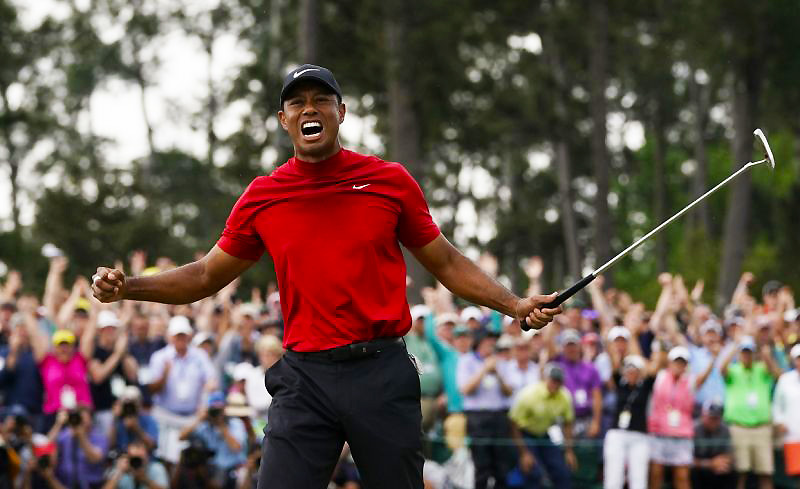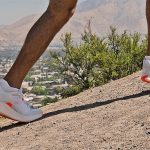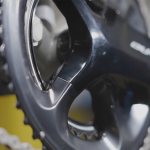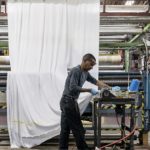By Eric Smith
<span style="color: #808080;">Business was brisk last month at PGA Tour Superstore’s brick-and-mortar locations and on its website, but customers weren’t just adding any old golf gear to their actual or virtual shopping carts.
During the days leading up to and immediately following the final round of the Masters Tournament on Sunday, April 14, they had their credit cards drawn in order to purchase some very specific products—a certain hat bearing the initials “TW” and a certain Nike mock-neck, short-sleeved shirt (red, of course).
The signature items of the world’s most popular golfer. Items that saw a resurgence when that golfer won on the sport’s biggest stage.
The industry is fond of saying that Tiger Woods doesn’t move the needle; he is the needle. And Woods’ triumph at the Masters sparked all manner of golf fans—from the hard-core to those who tune in once a year for the splendor of Augusta National—to buy apparel and equipment and lessons, giving the sport an economic shot in the arm.
PGA Tour Superstore, for example, enjoyed a 50 percent boost in online comps for the Masters week compared to the year-ago period. “We were killing it online—Saturday, Sunday and Monday,” said PGA Tour Superstore CMO Matt Corey. “It was just nuts to see.”
In fact, the week after the Masters would go down as the biggest week for sales in PGA Tour Superstore year history, according to Megan Mahoney, the company’s director of communications. And in the two weeks that followed the Masters, sales of Nike apparel, headwear and footwear were up 50 percent versus 2018. That Nike mock Tiger wore during the Masters quickly became the top-selling item in the department.
So began another round of the “Tiger Effect,” aka the “Tiger Bump”—a substantial though not always sustainable boost the entire sport enjoys whenever Tiger Woods is in the hunt to win a tournament, especially a major. And when he does prevail, something he hadn’t done much of in recent years until taking the Tour Championship in Atlanta last fall and then the Masters last month, every stakeholder in the sport flourishes.
“Tiger’s victory at the 2019 Masters transcended golf, reaching the masses around the world,” said Greg McLaughlin, CEO, World Golf Foundation. “His popularity and contributions to the game of golf have a direct financial benefit to every business associated with golf and sport.”
Increasingly Healthy Business
When Woods made the weekend cut and then made history with a one-stroke margin of victory to claim his 15th major, PGA Tour Superstore was just one of the many beneficiaries.
Another was online golf retailer Global Value Commerce (GVC), whose websites include GlobalGolf.com, GlobalGolf.ca, 3balls.com and FairwayStyles.com. The company saw a huge jump in visitors to those sites, according to CEO Ed Byman.
“Anytime Tiger wins, it’s good for the industry as a whole,” said Byman, a former PGA Tour player from the 70s. “We saw a 30 percent increase in website traffic immediately following his win. We hope and expect that will continue as he contends in the year’s remaining majors.”
Makers of golf gear are also experiencing the “Tiger Effect,” although they often are a lagging economic indicator of Woods’ accomplishments. Take Acushnet Holdings Corp., the parent of Titleist and FootJoy, which endured a first-quarter earnings loss and slight revenue gain yet remains bullish on the sport in part because of what Woods did at Augusta last month.
“Tiger’s Masters victory was a great moment for the game as it catapulted golf to center stage of the sports landscape,” said Achushnet President and CEO David Maher. “These moments are all part of golf’s story in 2019, which we believe helped to fuel enthusiasm for the game and business of golf.”
Acushnet wasn’t alone in praising what Woods did for the sport. Callaway Golf Co., which posted record Q1 revenue and earnings gains, understands how much that one player can boost golf.
“Tiger Woods is very good for the game,” said President and CEO Chip Brewer. “There are a lot of young players out there, the National Golf Foundation reported for the first time a long time increased participation and interest get these noncore golf opportunities such as Topgolf and other segments that are really growing interest in the game, so it’s in a healthy spot right now.”
Brett Andress, an analyst with KeyBanc Capital Markets who covers the golf industry, including the sport’s public companies, wrote in a note to investors following Woods’ win that it would indeed serve as a rising tide to lift all boats.
For example, he said that TaylorMade, Woods’ equipment sponsor, expected to see a big benefit from the Masters exposure. The company capitalized on Woods’ Masters win by promoting the clubs he used during the tournament on its website, and its CEO, David Abeles, was fully expecting an industry-wide surge in sales.
“I do anticipate golf retail specifically to pick up,” Abeles told Yahoo Finance. “We’re seeing it within our own e-commerce business right now where we are seeing 2-3X the volumes come to our website to express interest and ultimately purchase P7TW [Tiger Woods-branded] products.”
Andress added in his note that the firm has “enough evidence to have reasonable confidence that Tiger Woods’ success is good for industry sales, which is a favorable development as the industry faces tough compares in 1H19, and at the very least should bode well for investor sentiment around the health of the industry.”
But, he added, even without the “Tiger Bump,” the industry’s retail is “already off to a healthy start in 1Q19 (+3.2 percent through February) despite headlines about rounds played weakness during this period, and we look towards the March retail release this week as further validation of this trend.”
‘Tiger Effect’ Reaches Far And Wide
Woods’ made-for-television run during the Masters clearly gave the CBS broadcast a ratings bump. Although overall viewership was down because the final round had to be moved up into morning to allow players to finish before rain pounded Augusta, the presence of Woods salvaged what otherwise could have been a letdown.
Other golf stakeholders have seen the “Tiger Effect” spread fortunes their way. GolfTec provides golf lessons and helps individuals find the right set clubs by analyzing their swing mechanics and identifying customizable drivers and irons to match. In other words, CEO Joe Assell says, GolfTec is in the “golf improvement business.”
And though GolfTec has no official relationship with Woods, his Masters win clearly inspired golfers of all skill levels to seek out the company’s ability to help them improve. Assell said in the week following the Masters, the company’s web traffic was up 40 percent, swing evaluation bookings grew 16 percent, club fitting bookings increased 27 percent and new customer inquiries spiked 34 percent.
While it’s too soon to tell, many believe Woods’ resurgence could have a lasting effect on the game. Certainly, his early career brought people to the sport in droves. But even without Woods, golf was on the upswing, based on the National Golf Foundation’s recent bullish outlook for the industry.
On-course participation in 2018 marked its first measured increase in 14 years. On-course participants grew 1.7 percent to 24.2 million from 23.8 million in 2017. On-course participation had been trending flat or down slightly since 2004.
Joe Beditz, NGF’s president and CEO, noted that while the slight gain is within the range of a statistical error, “it sure is nice to see it on the upside.”
Overall, total golf participation, including off-course-only participation, grew 4.4 percent in 2018 to 33.5 million from 32.1 million and has been showing slight gains in recent years due to interest in increasingly popular off-course forms of the game such as Topgolf, Drive Shack and indoor simulators.
Another Bump On The Horizon?
The golf industry’s cheers after last month’s Masters win might have mellowed a little, but they still echo at courses and retail shops around the nation. And they are likely to gain volume as the industry preps for this week’s PGA Championship at the Bethpage Black Course in Farmingdale, NY.
This tourney offers another big stage for Woods to shine, but even if he fails to make the cut, his win at Atlanta last fall and at the Masters last month gave the sport another welcome bump as it looks to regain some of its mid-2000s moxie.
“Tiger was the catalyst for a lot of growth the industry saw in the early 2000s,” said GVC’s Byman. “The fact that the dip in his career coincided with the economic struggles that began in 2008 played a significant role in the industry’s downturn. That being said, his return to the top of the sport coming during a time of relative economic prosperity can be a big boost for the industry.”
PGA Tour Superstore’s Corey echoed that comment, adding that Woods is playing with a much different outlook on life than he had before.
“We’re seeing a guy who smiles on the golf course, yet who can still intimidate people and be powerful and emotional and passionate,” Corey said. “It seems like he really enjoys the fact that he’s playing golf again. Tiger Woods gets pumped up, and people love that.”
No matter the changes in how Woods approaches the game, however, his success has the same effect on the sport today as it did 20 years ago. That’s something everyone in the industry has been reminded of once again.
“He’s an iconic figure, and he does drive a lot of interest for the sport in general,” Corey said. “Our sales were OK leading into the Masters, but when he wins, there’s an immediate boost in store traffic, store sales, online sales, and that goes beyond Nike product. Now, is that sustainable forever? No, of course not. But he boosts everything about the sport.”
Photo courtesy AP
[author] [author_image timthumb=’on’]https://s.gravatar.com/avatar/dec6c8d990a5a173d9ae43e334e44145?s=80[/author_image] [author_info]Eric Smith is Senior Business Editor at SGB Media. Reach him at eric@sgbonline.com or 303-578-7008. Follow on Twitter or connect on LinkedIn.[/author_info] [/author]
















